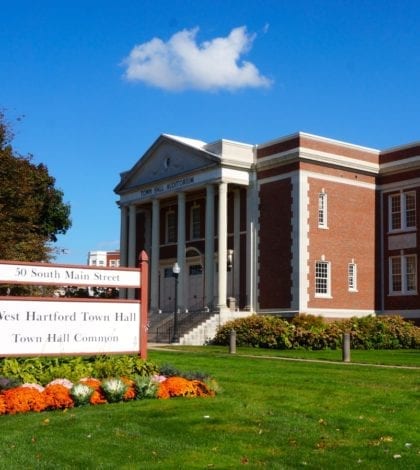West Hartford’s State Aid Would Drop Again under Governor’s Recommended Adjustments

Audio By Carbonatix

West Hartford Town Hall. Photo credit: Ronni Newton
Gov. Dannel P. Malloy held a news conference on Monday, and introduced budget adjustments for Fiscal Year 2019.
By Ronni Newton
Gov. Dannel P. Malloy surprised legislators, town leaders, and reporters by releasing FY2019 budget adjustments two days ahead of schedule, and at a press conference at noon Monday recommended a $20.73 billion budget plan for the state.
CTNewsJunkie’s Christine Stuart reported that the overall plan is a $70.5 million overall increase (0.3 percent), and “according to Office of Policy and Management Secretary Ben Barnes, reduces the forecasted deficits in 2020-22 by cutting them almost in half.”
West Hartford Chief Operating Officer Peter Privitera, who after spending several hours reviewing the governor’s proposal with Town Manager Matt Hart, said the net result for the town in the governor’s proposed adjustment is a total state aid reduction of $509,923 for FY2019 as compared to what was received in FY2018.
Malloy’s adjustment proposal kept West Hartford’s Educational Cost Sharing (ECS) grant for FY2019 in line with what had been passed in the biennial budget late last fall. ECS funding is budgeted to increase from $18.1 million to $18.7 million for FY2019.
However, under the governor’s proposal West Hartford’s $655,710 Municipal Stabilization Grant would be eliminated for FY2019, and $166,682 would be cut from the Mashantucket Pequot and Mohegan Fund Grant.
“The reduction totals about $220,000 on the General Fund side,” Privitera said.
In addition, the proposal reduces Local Capital Improvement (LOCIP) funds from $789,817 to $502,611.
The net result is just under $510,000, Privitera said.
Hart said that the reductions would certainly put more pressure on the town. “I understand that the governor and the state are facing real fiscal challenges,” Hart said, but this proposal just continues to shift the burden onto the local taxpayers.
Privitera, who first saw the proposal Monday afternoon, said he had not had the opportunity to do further analysis, but noted that it’s a “continual decline in state aid.”
Over the past two years, actual funds West Hartford has received from the state have decreased by $4.3 million, Privitera said.
“It’s all moving parts. You get something, you lose something,” Mayor Shari Cantor said late Monday afternoon. “We want predictability and stability. We understand that the state is in a bind but there’s nowhere else for us to raise revenue,” she said.
“The governor continues his squeeze on towns and property taxpayers. Enough,” said State Rep. Derek Slap (D-19th district).
Slap did express some optimism about the legislature’s ability to find better solutions. “I’m hopeful that the bipartisan approach that took hold last session and saved communities from [Malloy’s] executive order continues this year,” Slap said.
One item included in the governor’s adjustment proposal could lessen the tax burden for residents who itemize deductions through “a series of new steps to allow Connecticut’s citizens to receive more friendly tax treatment following the federal tax changes, including changes to pass-through entities, decoupling expensing and bonus depreciation, and allowing municipalities to create charitable organizations supporting local interests,” according to a news release from Malloy’s office.
“I hope there’s going to be some regionalized discussion,” Cantor said regarding that proposal. It will likely require some type of legislative action, she said.
Town Council Minority Leader Chris Barnes said Monday that a serious problem is that the bipartisan budget passed by the legislature last fall gave the governor authority to make cuts, which he hasn’t been able to do. “He knows we will have a problem with revenue come April, and he has to find a way to make it work,” said Barnes.
“Everything is going to be on the table,” Barnes said, but because of collective bargaining agreements that were agreed to, there are fewer tools available to reduce spending.
“The governor’s proposals aren’t surprising and the legislature has a lot of work to do in this short session,” Barnes said. “We’re in a difficult place.”
Hart said that he and Privitera are currently reviewing budget submissions from town departments.
“We will treat this as an important data point, and bring it to the attention of the Town Council and our legislative delegation,” Hart said.
In a news release, Malloy stated, “The budget we are proposing today is about the future – specifically Connecticut’s long-term fiscal stability. This plan continues to pay down the state’s long-term obligations, further reduces our reliance on one-time revenues, and identifies clearer and more achievable savings targets in the underlying budget. When it comes to our budget, there are few easy answers left for state leaders – what matters most is that we achieve balance with realistic and responsible changes.”
The legislative session begins on Wednesday, and more budget-related news should be expected as lawmakers have a chance to review the governor’s proposal.
More information about the potential impact of the adjustment proposal on the state as a whole and on other municipalities, and suggestions Malloy has made for closing the budget deficit, can be found on CTNewsJunkie.com.
Like what you see here? Click here to subscribe to We-Ha’s newsletter so you’ll always be in the know about what’s happening in West Hartford!



